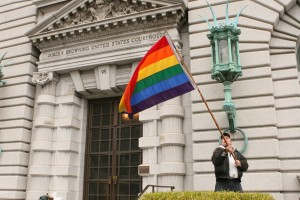The next and final chapter in the legal saga of Proposition 8, California’s ban on same sex marriage, is set to begin Friday morning at the U.S. Supreme Court. And unlike the previous legal skirmishes in which this measure has been mired for four years, this one will take place behind closed doors.

The nine justices will discuss which cases to accept for review -- or “grant certiorari” -- at a conference meeting in Washington D.C. In addition to this case, now officially known as Dennis Hollingsworth, et al., Petitioners v. Kristin M. Perry, et al, the justices will consider several cases challenging the Defense of Marriage Act, or DOMA, including one from California.
Since voters approved Prop. 8 in November 2008, the legal and cultural landscapes have shifted dramatically on same sex marriage. Eight states and the District of Columbia have joined Massachusetts in allowing gay and lesbian couples to marry. President Obama, with a nudge from Veep Joe Biden, endorsed the rights of gay and lesbian couples to wed. His Justice Department stopped defending DOMA -- and eight federal courts, including two Courts of Appeal, have struck down DOMA.
Finally, Don’t Ask, Don’t Tell, the military’s ban on LGBT soldiers, sailors and Marines serving openly, was repealed without incident.
Public opinion has also sharply shifted in favor of gay marriage, and the Republican Party has mostly backed away from using it as a wedge issue in national politics.